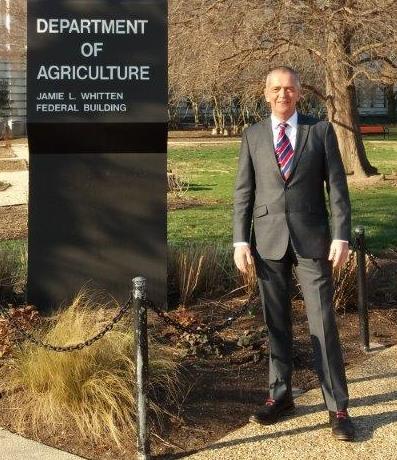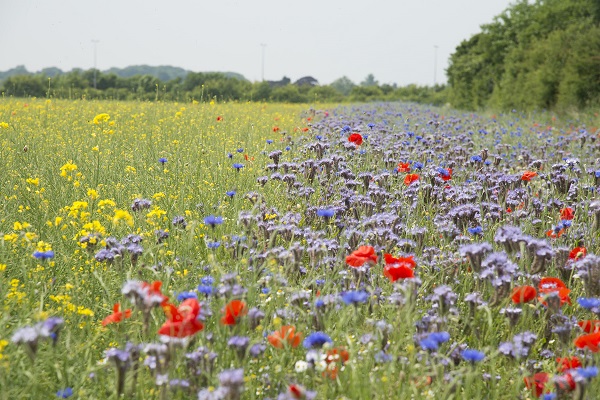Defra’s chief scientist has come under fire for projecting long-term aspirations for food production while supporting measures that appear to frustrate farmer efforts to deliver more immediate efficiency gains.
By Tom Allen-Stevens
A robust defence of current practice has followed comments from Defra chief scientist Professor Ian Boyd that UK Farming must become ten times more efficient.
Scientists have called for Defra to help address short-term problems, such as pesticide resistance and a restricted chemical armoury, while NFU deputy president Guy Smith points out that British farmers, more than most, embrace new technology.
“We always aspire to become more efficient and always look for the new ideas to bring on to our farms that will enable that. So I salute Professor Boyd’s challenge to the farming industry to use resources more efficiently and to lighten our environmental impact.

Guy Smith
“But for most British farmers the returns on food production simply do not allow the investment required at the pace he may be looking for,” he notes.
“Our costs are raised by regulation, yet our prices are eroded by imports produced to lower standards, using technologies we’re unable to use here.”
Guy criticises Ian’s assertion that “most farming produce is importable”, pointing out this simply exports the UK’s environmental responsibilities, rather than addressing them.
It could also make the UK worryingly dependent on other nations for food at a time when the government needs a strong negotiating position in trade talks, he asserts.
“As for the technologies he appears to support, vertical farming may supply a proportion of leafy produce in urban areas, but will it really ever supply sufficient quantities of our main staples?
“The UK, for instance, uses about 6-7M tonnes/yr of wheat for human consumption, 90% of which is UK grown. How much of this could sensibly be produced in vertical farming systems?”
With regards neonicotinoid seed treatments, that Ian said were banned as a result of their widespread use and farmers’ over-dependence on them, Guy notes an element of prophylactic use with seed treatments is “inevitable”.
“It’s a very precise technology but in the absence of more accurate weather forecasting or predictions of pest pressure, there will always be an element of ‘insurance’ when it comes to seed dressings.
“Again it should be noted that the crops no longer produced in the UK because of the neonic ban will be replaced by imports from places where they’re used in abundance.”
Effect on soil fauna
Head of UK communications at Bayer, Dr Julian Little confirms that all evidence on the safety of neonics has been submitted to Defra as well as other regulatory authorities around the world, including their effect on soil fauna.
“Before you allow a product to come to market, you must prove it doesn’t accumulate in the soil to a concerning level and neonics don’t. Nor do they move in the soil, nor accumulate in ground water,” he assures.

Neonics don’t accumulate in the soil to a level that could affect bees, says Bayer.
He questions studies that suggest flowers in grass margins take up residual amounts of neonics to a level potentially harmful to beneficial insects, such as bees.
“If they did, there would be an effect on the hyper-sensitive target species. But the very fact that flea beetle populations accumulate so quickly in a field with just a one-year break from neonics shows this isn’t the case.”
Bayer has a good track record of developing products specifically to be used over a wide area, he points out. “The economics of niche products, especially in Europe, mean we focus our resources on technologies we are confident will deliver clear resource efficiencies for a great number of farmers.
“This means we always look at the consequences of our products’ widespread use. While I’ve sympathy with the notion that farmers should never become over-dependent on a single technology, a good product that works well tends to get used widely.”
However, Julian says that the statistical strength of evidence needed to prove that beneficial insects will never be harmed by neonics, as requested by EU regulatory authorities, makes it almost inevitable that any product will fail such a test.
“But to justify a ban on concerns, rather than evidence, does not demonstrate a willingness to base policy decisions on sound science – that’s a very worrying position for Defra to take.”
Sharp response
Ian’s remarks on neonics drew a sharp response on Twitter, with Lincs sugar beet grower Tim Beaver calling them “utter, utter rubbish”.
“I’m all for disrupters to move things on in agriculture. However, blanket banning the most efficient and relatively safe active ingredients overnight when we have no alternatives is totally unacceptable and based on votes, not science.”
Rutland farmer and consultant Sarah Bell took a more conciliatory approach. “I think as an industry we have to be alive to the fact that in Ian Boyd there is a disruptive scientific force advising government. We either get proactive or become organic by default.”
Fenland farmer Tom Clarke questioned the effect on global food supply of Ian’s proposal to use “less than 70% of some of the most productive agricultural land in the world” for food production. “I doubt vertical farming’s gonna cut it,” he added.
“What was interesting is that [Ian] spurned incrementalism, which is scientific, and advocated live experiments without controls or null hypotheses, which rip tools that work from our hands in order to stimulate innovation.”
Scientists’ view
This view of how to respond to the challenge Ian sets down of making agriculture ten times more efficient is echoed by ADAS scientist Dr Daniel Kindred.
“I think we need both high-risk long-term game-changing approaches along with collaborative short to medium-term improvements to best practice,” he says.
“It would be helpful if government could provide mechanisms to support both.”
Independent agricultural consultant Keith Norman agrees. “Ian Boyd’s vision is extremely long term and definitely ‘out of the box’,” he says.
“But what is missing is the ‘here and now’ and a strategy of support for some major problems primary production is facing.
“It’s not fair just to say that this is industry’s problem. We need government support to help us get through the techno valley we are looking into, with regulation and resistance severely depleting our toolbox.”




